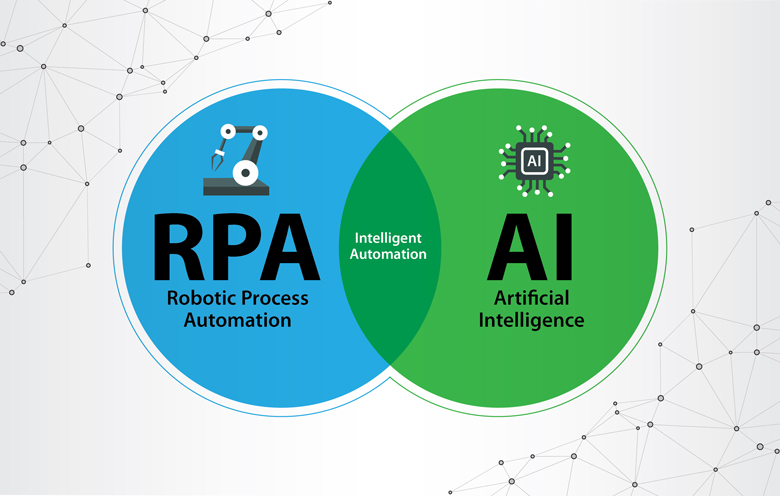In this era of fast-moving business changes, organizations need an end-to-end automated solution which is a combination of cloud, artificial intelligence (AI), robotics and smart machines. One such technology that has emerged in the digital world is – intelligent automation. This technology comprises of enhanced RPA, artificial intelligence, natural language processing, cognitive automation and more.
Intelligent automation is about carrying out process transformation intelligently. This means knowing what to automate, how to automate and when to automate with which tools and technologies. It is unquestionable that the use of intelligent automation is disrupting the way work is done in commercial as well as government sectors.
How does Intelligent Automation work?
Intelligent automation technology differs from normal RPA automation because it has added layers of machine learning and artificial intelligence capabilities integrated with it. Intelligent automation-enabled applications can range from gathering data, analyzing and making decisions about textual information to guiding autonomous vehicles and cutting-edge robots.

Robotic Process Automation Services
Businesses continuously look forward to improving operational efficiencies, increasing revenue and reducing operating costs.
Here is an example – while a customer is filling the online form for bank account opening, and if he/she forgets to update a section or enters a wrong detail, the IT system will reject the form and request for human interference to rectify the issue. However, in a similar case, if IA is deployed then the system will identify the mistake and correct it without any human intervention. Such a self-learning and intelligent application brings in more productivity in the business in terms of time and effort and enhances the overall customer experience.
According to McKinsey, IPA can translate to 20% to 35% improvement in efficiency, 50% to 60% reduction in process time, and returns on investment in triple-digit percentages.
Now let’s look at the advantages that intelligent automation adoption brings to the table.
Key business benefits that intelligent automation provides your organizations
Support in better decision making
Intelligent process automation is powered by AI and ML which makes it easy to analyze a huge amount of data and generate value. Moreover, an AI-driven automation solution can convert data into actionable insights which can be leveraged for better business decisions.
Zero downtime
According to Gartner, the average cost of IT downtime is $5,600 per minute. A business experiences a heavy loss due to system outages. Using intelligent process automation and robots, you can monitor your infrastructure round-the-clock. Also, AI can detect threats easily that are difficult for humans to identify. When an incident can be identified quickly and the platform can address and resolve those issues, downtime can be drastically reduced.
Increase in regulatory compliance
Every industry has some or the other legal compliance to adhere to, which may need manual interference. With intelligent process automation tools, you can ensure data privacy and record retention, and uphold sales policies and financial regulation requirements in a better way. These processes or workflows can be performed without any human intervention.
Streamline inefficient business operations
A lot of businesses have overwhelming and disorganized processes and workflows. These businesses make their employees spend hours to manually do the work and fix the errors. Using an Intelligent Automation-enabled solution for business operations, companies can help their employees in applying their skills to important initiatives like utilizing data insights in developing advanced business strategies.
Increase employee satisfaction
Intelligent automation will not take away human jobs, instead it will increase human capabilities. By shifting the tedious and repetitive work from human to machine, it is obvious that productivity will increase. Meanwhile, employees will be able to perform other meaningful tasks. And when employees can spend their time on the interesting aspects of their jobs then their job satisfaction level rises automatically.
Achieve speed and accuracy
By integrating intelligent process automation in your business systems, you can reduce the risk of transactional errors such as incorrect data inputs, missed steps, incomplete processes and other mistakes in rule application. This helps to improve overall data accuracy and data-driven decision-making.
Process large volumes of complex data
As any organization continues to grow, it gathers a huge volume of data. Processing these large amounts of data manually can be very laborious, therefore a lot of organizations end up processing only a small portion of their total data. With intelligent automation and RPA, data management becomes seamless. Several repetitive tasks, such as data aggregation and curation can be easily managed with automation. Moreover, applying RPA to large data repositories makes tasks such as data cleansing, normalization, data wrangling, and creation or updating of metadata more efficient. All these tasks are highly repetitive, and each data access situation demands special considerations.
The final say
By implementing intelligent automation, organizations can greatly improve their service delivery, reduce operational costs, and enhance customer satisfaction thereby increasing the company’s brand name and ROI. If you want to know how to integrate intelligent automation solution to your business model, then talk to our experts today!









